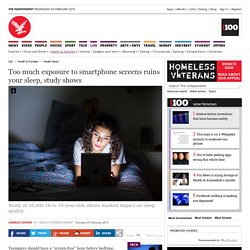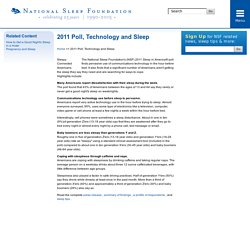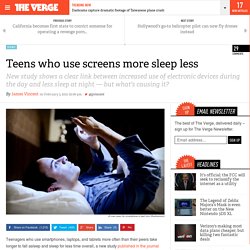

Too much exposure to smartphone screens ruins your sleep, study shows - Health News - Health & Families. In a study of 10,000 16 to 19-year-olds, researchers in Norway found that the longer a young person spent looking at an electronic screen before going to bed, the worse quality sleep they were likely to have.

Those who spent more than four hours a day looking at screens had a 49 per cent greater risk of taking longer than an hour to fall asleep and were three and a half times more likely to sleep for under five hours a night. Almost all of the teenagers in the study, published in the online journal BMJ Open, said they used one or more electronic devices within an hour before going to bed.
Excessive TV viewing and computer use have previously been linked to higher levels of depression and anxiety in children. The researchers said that messaging friends online and watching TV may be simply replacing sleeping time, but may also be stimulate the nervous system or interfere with the body clock.
“Parents should be aware of the use of all types of electronic devices in the bedroom,” she said. 2011 Poll, Technology and Sleep - National Sleep Foundation. The National Sleep Foundation's (NSF) 2011 Sleep in America® poll finds pervasive use of communications technology in the hour before bed.

It also finds that a significant number of Americans aren't getting the sleep they say they need and are searching for ways to cope. Highlights include: Many Americans report dissatisfaction with their sleep during the week. The poll found that 43% of Americans between the ages of 13 and 64 say they rarely or never get a good night's sleep on weeknights. Communications technology use before sleep is pervasive. Interestingly, cell phones were sometimes a sleep disturbance. Baby boomers are less sleepy than generations Y and Z. Coping with sleepiness through caffeine and naps. Teens who use screens more sleep less. Teenagers who use smartphones, laptops, and tablets more often than their peers take longer to fall asleep and sleep for less time overall, a new study published in the journal BMJ Open shows.

The finding suggests that if teenagers want to sleep better, they should try looking at screens less. "The more you spent on devices the less you slept and the longer it took to fall asleep. " Researchers surveyed more than 10,000 16-to-19-year-olds from Norway, questioning them about their use of electronics and sleeping habits. Those who used gadgets including MP3 players, video game consoles, tablets, smartphones, and computers for more than five hours a day were three and a half times more likely to sleep for fewer than five hours at night and 49 percent likelier to need more than an hour to get to sleep. "There was a gradual increase up to this point," lead author Dr.
(BMJ Open) The study questioned teenagers on their screen time both throughout the day and during the hour prior to sleep. Dr. Americans Need More Sleep, According to New Study. Beware the negative effects of too much screen time for children. As a mother screams on the delivery table, her newborn suddenly pops out and cuts the umbilical cord after googling how to do it on his father's tablet.

The baby then grabs the nurse's phone and Instagrams a selfie, crawls to a laptop on the floor and signs into multiple social networking sites, and uses a GPS to find his way out of the hospital. This recent "Born for the Internet" ad campaign by mobile service provider MTS for its 3G Plus network is a bit extreme, but it's not uncommon these days to see babies and toddlers swiping away on their parents' touch screen gadgets. Screen time crowds out other activities that kids should be engaging in matthew davis, university of michigan Evidence from an increasing number of research studies suggests that limiting a child's screen time is the best approach.
Many studies have established positive correlations between excessive TV and video game use and weight gain among children. The Hong Kong Health Department adopts similar recommendations. Too much exposure to smartphone screens ruins your sleep, study shows - Health News - Health & Families - The Independent.